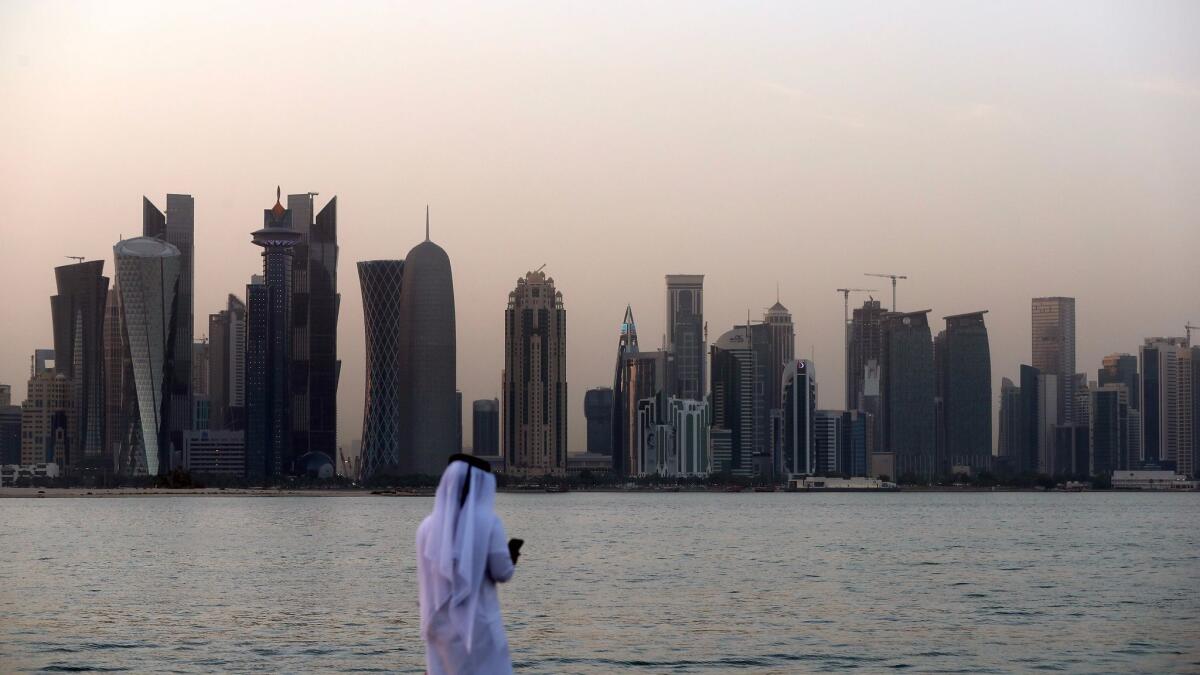Arab nations extend deadline in Qatar crisis by 48 hours

- Share via
Reporting from DOHA, Qatar — Arab nations extended a deadline early Monday for Qatar to respond to their list of demands in a diplomatic crisis roiling the Persian Gulf, saying Kuwait’s emir requested the delay as part of his efforts to mediate the dispute.
Saudi Arabia, the United Arab Emirates, Egypt and Bahrain cut off ties with 2022 FIFA World Cup host Qatar on June 5, restricting access to their airspace and ports and sealing Qatar’s only land border, which it shares with Saudi Arabia.
They issued a 13-point list of demands to end the standoff June 22 and gave the natural gas-rich country 10 days to comply.
The joint statement early Monday by the Arab nations said they expected Qatar to respond to their demands on Monday. The new deadline would expire late Tuesday or early Wednesday.
“The response of the four states will then be sent following the study of the Qatari government’s response and assessment of its response to the whole demands,” the statement said.
The four nations cut ties to Qatar over accusations that it supports extremists and over worries it maintains too-close ties to Shiite power Iran. Qatar long has denied sponsoring militants even though it maintains ties to Iran, with whom it shares a massive offshore natural gas field.
“Qatar is not an easy country to be swallowed by anyone. We are ready. We stand ready to defend our country. I hope that we don’t come to a stage where, you know, a military intervention is made,” Qatari Defense Minister Khalid bin Mohammed al Attiyah told Sky News.
Qatar’s main QE stock index lost more than 3% when it reopened Sunday after a weeklong hiatus for the Eid al-Fitr holiday break — its first session since the demands were laid out. It eventually recovered some of its losses later in the trading session to close down 2.3% at 8,822.15.
Qatari supermarkets saw panic buying when the four countries initially cut ties. But the capital, Doha, was largely calm Sunday as residents waited to see how the crisis would play out.
Abdelaziz al-Yafaei, a Qatari out for an evening walk along the city’s bayside, said he was reassured that things would be fine, regardless of what happens over the course of the next days.
“We have a government, thank God, that is wise and knows how to provide for all of our needs, how to maintain security,” he said. “We have enough funds in the country, on the economic side. All of the affairs are headed for the better.”
Qatar’s foreign minister, Sheik Mohammed bin Abdulrahman al Thani, showed no signs of backing down in during a news briefing in Rome on Saturday, saying that they were never meant to be accepted and that his country “is prepared to face whatever consequences.”
While in Rome, Mohammed met with Italian Foreign Minister Angelino Alfano, who gave his backing to ongoing mediation efforts led by Kuwait. U.S. Secretary of State Rex Tillerson has also tried to resolve the dispute, with the U.S. last week urging Saudi Arabia and its allies to stay “open to negotiation” with Qatar.
Russian President Vladimir Putin has separately spoken with the leaders of Qatar and Bahrain, urging direct dialogue among all the states involved, according to statements released by the Kremlin on Saturday.
ALSO
Same-sex couples and supporters praise Germany’s legalization of same-sex marriage
Bedouins in the West Bank hold fast to their land — as pressure builds for them to leave
More to Read
Sign up for Essential California
The most important California stories and recommendations in your inbox every morning.
You may occasionally receive promotional content from the Los Angeles Times.










